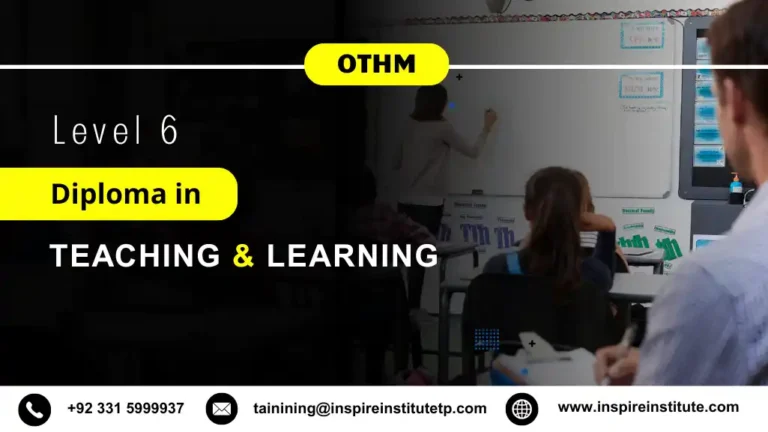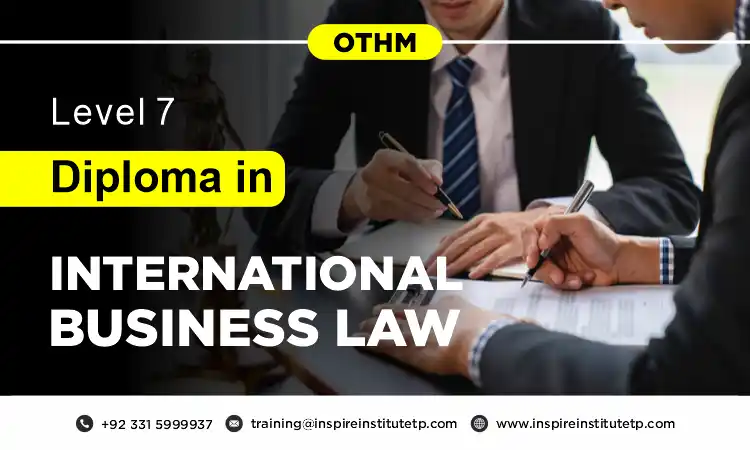OTHM Level 4 Certificate in Equality, Diversity and Inclusion
The OTHM Level 4 Certificate in Equality, Diversity and Inclusion is a UK-regulated qualification designed to equip individuals with the knowledge and skills needed to promote inclusive practices across a wide range of sectors. This course provides a strong foundation in understanding the principles of equality, the importance of diversity, and strategies to foster inclusive environments in the workplace and beyond. Ideal for professionals, HR practitioners, and aspiring leaders, this qualification supports career development while contributing to a more equitable society.
Why Choose this Qualification
Choosing the OTHM Level 4 Certificate in Equality, Diversity and Inclusion opens the door to meaningful personal and professional growth. Here’s why this qualification stands out:
- Support Positive Social Change
Become a catalyst for change by helping organisations build inclusive environments that celebrate diversity and ensure equal opportunities for all. - Globally Recognised Qualification
Regulated by Ofqual (UK), this certificate ensures high academic standards and international credibility, making it valuable across sectors and borders. - Enhance Your Professional Profile
Equip yourself with the skills to implement inclusive practices, support organisational change, and lead with fairness and empathy in today’s diverse workplaces. - Versatile Career Opportunities
This qualification is ideal for professionals in HR, education, healthcare, public service, and leadership roles who aim to foster inclusive cultures and promote equality. - Current and Practical Curriculum
The course content reflects modern challenges and best practices in equality and diversity, ensuring real-world relevance and immediate applicability. - Flexible Learning Options
With online and blended learning formats, you can study at your own pace while balancing work and other commitments.
Course Overview
Ofqual Regulated Qualification
Course Level: 4
Average Completion Time:
6-24 Months
Study Units: 3 Units
Qualification Structure
The OTHM Level 4 Certificate in Equality, Diversity and Inclusion qualification consists of 3 mandatory units, 36 credits, 360 hours Total Qualification Time (TQT) and the recommended Guided Learning Hours (GLH) for this qualification is a minimum of 125 hours.
Mandatory Units
- Equality and Diversity (6 Credits)
- Inclusive Practice (15 Credits)
- Action Research (15 Credits)
Who Should Take This Course
OTHM Level 4 Certificate in Equality, Diversity and Inclusion is ideal for individuals who are passionate about promoting fairness, respect, and inclusivity in their personal and professional environments. It is especially suited for:
- HR Professionals and Managers
Looking to enhance workplace diversity policies, improve inclusion strategies, and ensure compliance with equality legislation. - Team Leaders and Supervisors
Seeking to build inclusive teams, foster a respectful work culture, and lead with emotional intelligence. - Educators and Trainers
Wanting to integrate inclusive practices into their teaching methods and classroom environments. - Public Sector and Healthcare Workers
Committed to delivering services that are equitable, culturally sensitive, and accessible to all. - Aspiring Equality and Diversity Officers
Looking to enter or progress in careers focused on social justice, community engagement, and policy development. - Anyone Interested in Social Impact
Including volunteers, NGO staff, and advocates for human rights who want to make a positive difference in society.
Whether you’re starting your career or looking to upskill, this course provides the knowledge and tools to promote equality and inclusion in any setting.
Course Benefits
Enrolling in the OTHM Level 4 Certificate in Equality, Diversity and Inclusion offers a range of personal and professional advantages. Key benefits include:
- Make a Positive Impact
Contribute to building a more inclusive and equitable society in both your professional and personal life. - Recognised UK Qualification
Gain a prestigious certificate regulated by Ofqual, enhancing your CV and career prospects across multiple sectors. - Career Advancement
Open doors to leadership roles in HR, education, public services, and beyond by demonstrating expertise in equality, diversity, and inclusion (EDI). - Real-World Skills
Learn how to develop and implement inclusive policies, manage diversity in teams, and create fair, respectful workplace environments. - Stronger Communication and Leadership
Improve your ability to communicate across cultures, lead diverse teams, and resolve conflict with empathy and understanding. - Enhanced Social Awareness
Deepen your understanding of systemic inequality and learn how to challenge discrimination and bias effectively. - Flexible Learning
Study at your own pace with flexible online or blended learning options, ideal for working professionals.
Eligibility Criteria
To enrol in the OTHM Level 4 Certificate in Equality, Diversity and Inclusion, learners must meet the following entry requirements:
Age Requirement
Learners must be 18 years of age or older at the time of registration.
Educational Background
A minimum of a Level 3 qualification (or equivalent) is recommended. However, applicants with relevant work experience and a strong interest in equality and diversity may also be considered.
English Language Proficiency
For non-native English speakers, a reasonable level of English proficiency is required to understand course materials and complete assessments. This may be demonstrated through prior education or a recognised English language qualification.
The Qualification Process
Here is a step-by-step guide to help you understand the entire journey from pre-registration to certification:
- Self-Assessment:
Begin by evaluating your eligibility for the course. Ensure you meet the entry requirements, such as relevant qualifications or professional experience, as outlined for the program. - Registration:
Complete your registration by submitting the required documents, including a scanned copy of a valid ID, and pay the necessary registration fee. This is your first official step in the qualification process. - Induction:
An assessor will conduct an induction session to verify your eligibility and introduce you to the evidence requirements. During this stage:- If the assessor finds that you meet all the necessary criteria, you will proceed to the next step.
- If you do not meet the entry requirements, your registration will be canceled, and your fee will be refunded.
- Evidence Submission:
Based on the assessment criteria, you will need to submit evidence demonstrating your knowledge and competence. Consult with your assessor if you need clarification on the type and nature of the evidence required. This evidence could include assignments, projects, case studies, or professional experiences related to sustainability management. - Feedback and Revision:
The assessor will review your submitted evidence and provide feedback. Evidence that meets the required criteria will be marked as “criteria met.” If there are any gaps, the assessor will highlight them, and you will need to address those gaps by revising and resubmitting the evidence. - Competence Evidence:
Submit your final evidence demonstrating that you have successfully achieved all the learning outcomes. The assessor will mark your submission as “Criteria met” once everything is up to standard. - Internal Quality Assurance (IQA):
After your evidence is approved by the assessor, the Internal Quality Assurance Verifier (IQA) will review it to ensure that the assessment was carried out consistently and according to OTHM standards. - External Verification:
The IQA then presents your portfolio to OTHM External Quality Assurance Verifiers (EQA) for final confirmation. The EQA may contact you directly to verify the authenticity of your evidence. - Certification:
Once all internal and external checks are completed to satisfaction, OTHM will issue your official certificate, confirming that you have successfully achieved the qualification.
This comprehensive process ensures that learners demonstrate all necessary competencies and meet the high standards required for the OTHM Level 4 Certificate in Equality, Diversity and Inclusion.







